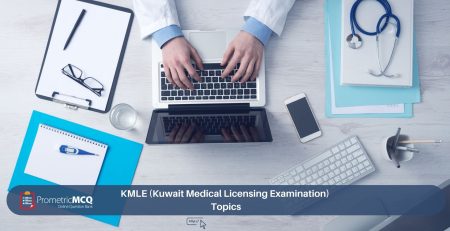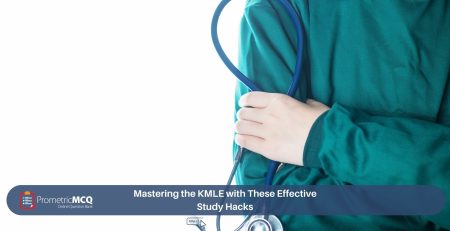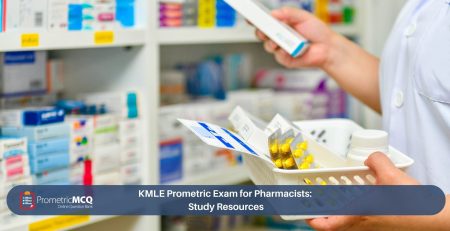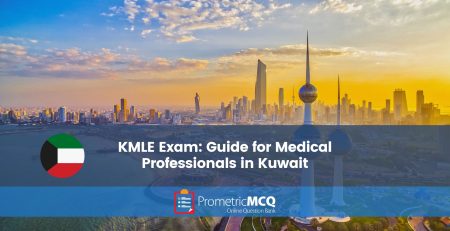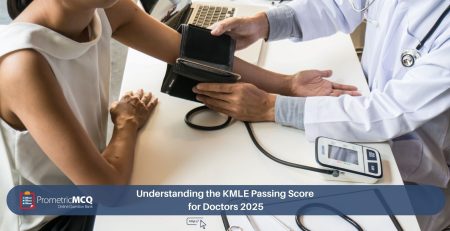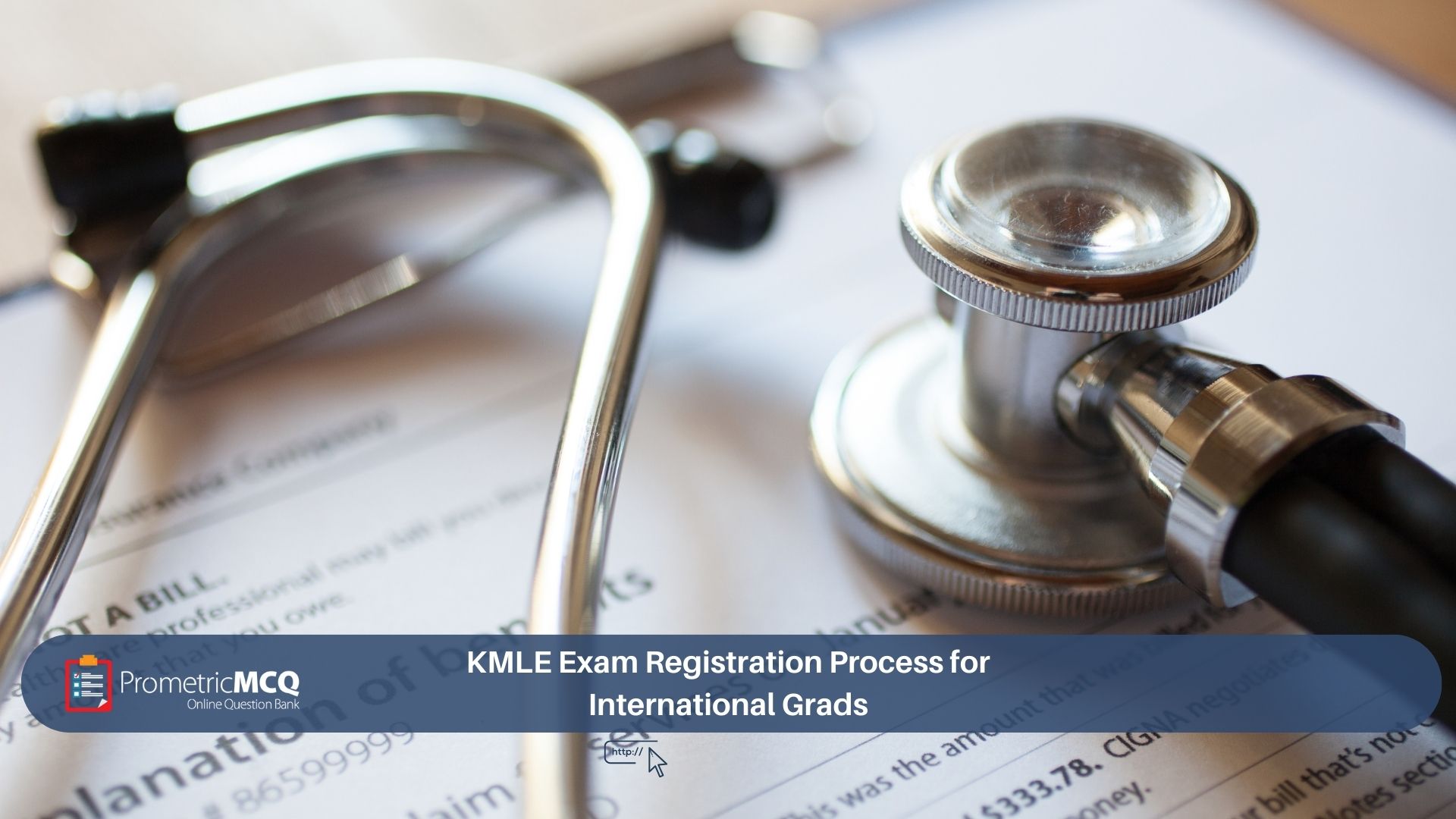
KMLE Exam Registration Process for International Grads
fatima@prometricmcq.com2025-09-24T14:41:15+00:00Table of Contents
ToggleKMLE Exam Registration Process for International Grads (2025)
For international healthcare graduates, the prospect of working in Kuwait’s sophisticated and thriving medical sector is a powerful motivator. However, before one can contribute to this dynamic environment, there is a crucial administrative journey to navigate: the Kuwait Medical Licensing Examination (KMLE) registration process. This multi-step procedure is the formal gateway to proving your qualifications and securing your eligibility to sit for the mandatory licensure exam.
For many highly skilled professionals, this administrative phase can feel more daunting than the exam itself. It involves coordinating with multiple entities—the Kuwaiti Ministry of Health, the DataFlow Group for credential verification, and Prometric for exam scheduling. A simple mistake or misunderstanding at any stage can lead to significant delays, frustration, and unnecessary expenses. A clear, accurate, and detailed understanding of the registration process is therefore not just helpful—it is essential for a smooth and successful transition.
This ultimate 2025 guide is meticulously designed to serve as your definitive roadmap to KMLE registration. We will provide a comprehensive, step-by-step walkthrough of the entire process, from preparing your initial document checklist to booking your final exam date. This article will break down the complexities of the Primary Source Verification (PSV) process, clarify the role of the Ministry of Health, and provide actionable tips to avoid common pitfalls. Supported by a detailed 10-point FAQ, our goal is to eliminate confusion and empower you with the knowledge to navigate the registration process with efficiency and confidence.
Key Takeaways on KMLE Registration
- It’s a Multi-Agency Process: Registration involves interacting with the Kuwaiti MOH, DataFlow, and Prometric. Understand the role of each.
- DataFlow (PSV) is the First Major Hurdle: Primary Source Verification of your documents is mandatory and often the most time-consuming step. Start it early.
- Documentation is Everything: Ensure all your documents are clear, valid, and correctly formatted before you begin. Small errors can cause major delays.
- Eligibility is Crucial: You must receive an eligibility number or approval from the MOH before you can book your Prometric exam.
- Plan Your Timeline: The entire process, from starting DataFlow to getting your exam result, can take 4-6 months. Plan accordingly.
Step 1: The Pre-Registration Phase – Your Document Checklist
Before you initiate any online application or pay any fees, the most critical first step is to gather and organize your documents. This preparation will save you immense time and prevent your application from being returned or delayed. While specific requirements can be updated, the core documents for all international graduates remain consistent.
Essential Document Checklist
Ensure you have high-quality, clear color scans of the following documents:
- Valid Passport: The photo page and any other relevant pages. Ensure it is not expired.
- Passport-Sized Photograph: A recent photo with a white background, conforming to standard specifications.
- Educational Qualifications: Your primary degree certificate (e.g., MBBS, MD, BDS, BSN, B.Pharm) and any postgraduate degrees (Master’s, PhD, specialty board certificates).
- Academic Transcripts: Official transcripts for all your educational qualifications.
- Internship Completion Certificate: A certificate confirming the successful completion of your mandatory internship period.
- Professional License(s): A copy of your valid professional license from your home country and/or any other country where you have practiced.
- Certificate of Good Standing (CGS): A certificate issued by the medical/nursing/dental/pharmacy council of your home country (and all other countries of practice). The CGS is typically valid for only 3-6 months, so time its issuance carefully.
- Experience Certificates: Detailed service certificates from all previous and current employers. These must clearly state your job title, dates of employment, and a brief description of your role. They should be on official letterhead, signed, and stamped.
- Curriculum Vitae (CV): An updated CV detailing your education and professional experience in chronological order.
Pro Tip: Create a dedicated folder on your computer and name each scanned file clearly (e.g., “Passport.pdf,” “Medical_Degree.pdf”). This organization will be invaluable when you start uploading documents to the DataFlow portal.
Step 2: The DataFlow Primary Source Verification (PSV) Process
This is arguably the most crucial and time-intensive part of the registration. The Kuwaiti Ministry of Health mandates that the authenticity of your credentials be verified directly from the source by the DataFlow Group. This process confirms that your documents are genuine and have not been altered.
How to Initiate and Navigate DataFlow PSV:
- Create an Account: Visit the official DataFlow Group website and create an account. Select Kuwait’s Ministry of Health as the regulatory authority you are applying to.
- Complete the Application Form: Fill out the online application form with extreme care. Ensure that every detail—your name, dates, university names—matches your official documents exactly. Any discrepancy can lead to a negative or “unable to verify” report.
- Upload Your Documents: Upload the clear, scanned copies of all the documents from your checklist into the appropriate sections.
- Pay the Fees: You will be required to pay the PSV fees online via credit card. The fee depends on the number of documents you need to have verified (e.g., one degree and two experience certificates will cost more than just one degree).
- Monitor Your Application: Once submitted, you will receive a reference number. You can use this to track the progress of your application on the DataFlow portal. The process involves DataFlow sending verification requests to your universities, licensing bodies, and employers.
The PSV process can take anywhere from 4 weeks to 3 months or more, depending on how quickly your issuing authorities respond to DataFlow’s requests. Starting this process as early as possible is the single best way to avoid delays in your overall licensing timeline.
Step 3: Ministry of Health (MOH) Application and Exam Eligibility
Parallel to or upon completion of your DataFlow report, you must formally apply to the Kuwaiti MOH to be deemed eligible for the KMLE exam. This is usually done through the official MOH online portal.
The MOH Application Process:
- You will create an account on the MOH e-services portal.
- You will fill out another application form, providing your personal, educational, and professional details.
- You will be required to upload many of the same documents you provided to DataFlow.
- You will link your DataFlow PSV report (or application number) to your MOH application.
- You will pay the MOH application processing fees.
After reviewing your application and your positive DataFlow report, the MOH will issue you an Eligibility Number. This number is your golden ticket to booking the final exam.
Step 4: Scheduling Your KMLE Exam with Prometric
With your eligibility number in hand, you can now schedule your exam. This is the final step in the registration process.
Booking Your Prometric Exam Date
- Go to the official Prometric website.
- In the test sponsor search, select “Kuwait Ministry of Health.”
- You will be prompted to enter your MOH Eligibility Number.
- Once validated, you can view the exam calendar and select your preferred country, city, date, and time for the exam.
- Complete the process by paying the Prometric exam fee online. You will receive an instant booking confirmation email with all the details of your appointment.
Once this step is complete, your registration is finalized. The focus now shifts entirely to exam preparation, a critical phase detailed in our guide to the KMLE exam questions.
Frequently Asked Questions (FAQs) on KMLE Registration
By far, the most common reason for delays is the DataFlow PSV process. This often occurs because the issuing authorities (universities or previous employers) are slow to respond to DataFlow’s verification requests. This is outside your direct control, which is why starting the process as early as possible is vital.
For the initial DataFlow verification, you typically only need clear scanned copies of your original documents. However, after you secure a job and for the final visa and ministry processing, your educational certificates will likely need to be attested by the Ministry of Foreign Affairs in your home country and the Kuwaiti Embassy. It’s wise to research this requirement in parallel.
A minor mistake (like a typo) can often be corrected by contacting DataFlow support. However, a significant error (like incorrect dates of employment) can lead to a negative or “discrepancy” report, which can seriously jeopardize your licensing application. Double and triple-check every single detail before submitting.
The total cost is a sum of several fees. As of 2025, a rough estimate is: DataFlow PSV fees ($250-$400+ USD, depending on documents), MOH application fee (~$100 USD), and the Prometric exam fee (~$200-$250 USD). Budgeting around $600 – $800 USD for the administrative process is a safe estimate.
Yes, many international recruitment agencies offer to handle the DataFlow and MOH application process on your behalf. While this can be convenient, it comes at an additional cost, and you are still responsible for providing them with all the correct documents and information.
A Certificate of Good Standing (CGS) is a letter from the medical/dental/nursing council where you are currently licensed, confirming that you are in good standing and have no disciplinary actions against you. It is a mandatory document. Crucially, it usually has a short validity (3-6 months), so you must time its request so that it remains valid throughout your application process.
This can be a challenge. In such cases, you should proactively contact DataFlow, explain the situation, and provide any alternative supporting documents you have (e.g., employment contract, final payslip, tax records). DataFlow has procedures for such situations, but it can cause delays.
No. You must have the eligibility number from the MOH to book your Prometric exam. The MOH will typically only issue this number after they have received and reviewed a positive DataFlow report. The processes are sequential.
While having a license from another GCC country is favorable and may sometimes streamline the process (e.g., transferring a positive DataFlow report), you will still need to apply to the Kuwaiti MOH and will almost certainly be required to pass the KMLE. There is no automatic license transfer without an exam for most professions.
Start early and be meticulously organized. Begin your DataFlow application at least 4-6 months before you plan to take the exam. Create a digital folder with clearly labeled, high-quality scans of all your documents. A methodical, organized approach is your best defense against delays and frustration.
Conclusion: Your First Step Towards a Career in Kuwait
The KMLE registration process is a detailed and systematic journey that serves as the foundation for your professional life in Kuwait. While it requires careful attention to detail and patience, it is a well-defined path. By following the steps outlined in this guide—preparing your documents meticulously, navigating the DataFlow process proactively, and scheduling your exam strategically—you can overcome the administrative hurdles efficiently. This will leave you free to focus on the most important task: preparing to ace the KMLE and prove you have the skills and knowledge to excel in Kuwait’s dynamic healthcare environment.
Registration Done? Now, Ace the Exam.
Our comprehensive question banks are tailored for every major healthcare profession, providing thousands of high-yield scenarios, detailed rationales, and simulated exams to guarantee your success.

